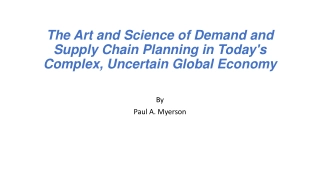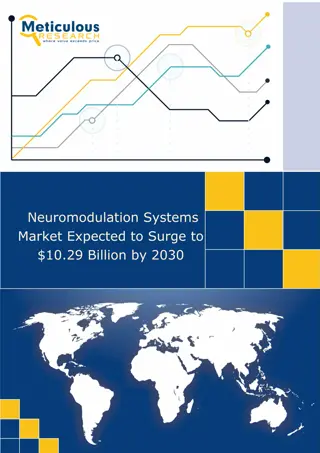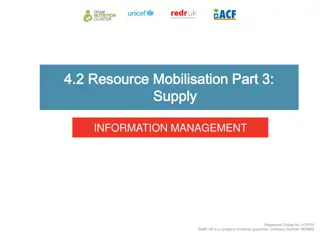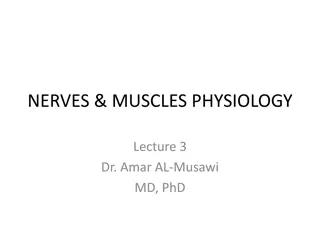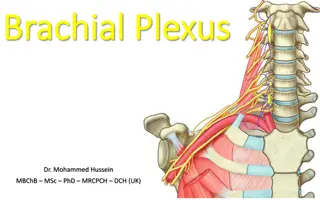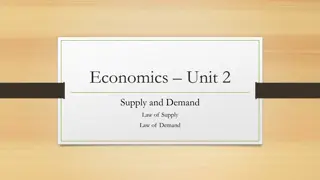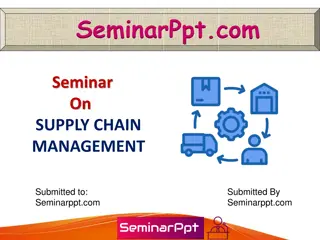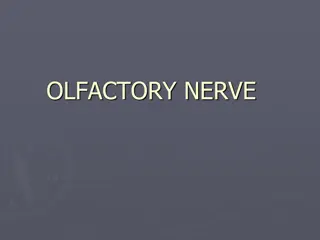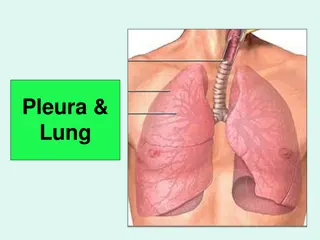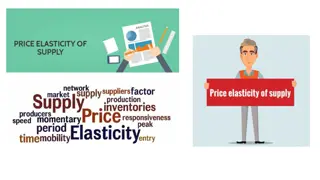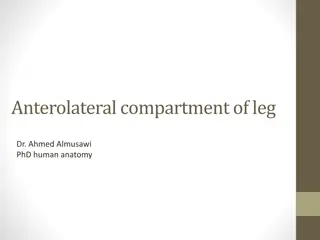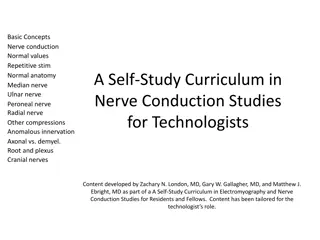The Popliteal Fossa
The popliteal fossa, a shallow depression at the back of the knee joint that serves as a passage for main vessels and nerves. Discover its boundaries, roof, floor, and contents like the popliteal artery, popliteal vein, tibial nerve, and common fibular nerve.
3 views • 9 slides
SMALL FIBRE
Small fiber neuropathy involves thin and unmyelinated nerve fibers, leading to various sensory disturbances. The Erlanger and Gasser classification details the different types of nerve fibers involved. Symptoms include burning, tingling, and numbness, often presenting in a stocking-glove pattern. Di
4 views • 53 slides
The Art and Science of Demand and Supply Chain Planning: Navigating Today's Global Economy
Explore the intricacies of demand and supply chain planning in the modern global economy through the insightful content provided in this book. From achieving supply and demand balance to adapting to uncertainties like navigating white water rapids, the text delves into strategies for improving accur
2 views • 201 slides
INVENTORY MANAGEMENT.
Managing inventory under ISO 15189 guidelines involves Quantity, Quality, and Process management. Key aspects include demand forecasting, inventory movement control, consumption planning, and ensuring fitness for purpose. Quantity management aims to balance demand and supply, manage supply economics
5 views • 13 slides
Nerve and muscle physiology
The lecture delves into the intricate structure of nerves, highlighting the morphology of nerve fibers and the process of myelination. It explores the classification of nerve fibers, emphasizing the role of dendrites, axons, and synaptic functions in the nervous system. The significance of Schwann c
4 views • 29 slides
Neuromodulation Systems Market Expected to Surge to $10.29 Billion by 2030
Meticulous Research\u00ae\u2014a leading global market research company, published a research report titled\n \u2018Neuromodulation Systems Market by Type (Spinal Cord, Sacral Nerve, Vagus Nerve, Deep Brain Stimulation),\n Application (Parkinson's Disease, Tremor, Depression, Epilepsy, Gastroparesis
0 views • 3 slides
Responsibilities and Collaboration in Supply Management for Emergency Response
The role of various stakeholders in supply management for emergency response is crucial. The Nutrition Cluster Coordinator (NCC) coordinates with partners to identify and address supply needs, while Information Management Officer (IMO) supports in calculating caseloads and consolidating supply reque
1 views • 24 slides
Understanding Aggregate Supply in the Short and Long Run
Aggregate Supply in the short and long run is crucial in understanding the relationship between the economy's price level and the total quantity of goods and services produced. In the short run, sticky wages and production costs play key roles in determining supply levels, while in the long run, cha
0 views • 16 slides
Understanding Nerves and Muscles: Physiology Insights by Dr. Amar AL-Musawi MD, PhD
Explore the intricate world of nerve fiber morphology, myelination, and classification in this enlightening lecture by Dr. Amar AL-Musawi. Delve into the significance of myelination in enhancing nerve function and learn about factors affecting conduction velocity. Discover the role of glial cells in
0 views • 15 slides
Understanding the Brachial Plexus Anatomy and Function
The brachial plexus is a crucial network of nerves in the upper limb, formed by nerve fibers originating from C5 to T1 spinal levels. It plays a significant role in innervating the upper extremity muscles and providing sensory feedback. The plexus is categorized into roots, trunks, divisions, cords,
0 views • 55 slides
Mechanism of General Anaesthesia Theories: Lipid Solubility, Surface Tension, Microcrystal, Protein Binding
Mechanism of general anaesthesia involves theories focusing on the interaction of anaesthetics with cell membrane components like lipids and proteins. The Lipid Solubility theory emphasizes the importance of an anaesthetic's affinity and solubility in nerve cell membranes, while the Surface Tension
1 views • 10 slides
Understanding the Intrinsic Muscles of the Tongue - Anatomy and Physiology Overview
In this detailed presentation by Dr. Sushma Tomar, Associate Professor of Anatomy, the intrinsic muscles of the tongue are explored, along with their functions, arterial and venous supply, lymphatic drainage, and nerve supply. The lecture covers the four intrinsic muscles in each half of the tongue,
1 views • 15 slides
Leprosy Nerve Examination by Dr. N. K. Kansal
This informative content provides a detailed guide on leprosy nerve examination conducted by Dr. N. K. Kansal, an Associate Professor. It covers the procedure for palpation of a nerve, emphasizing correct patient positioning and gentle palpation techniques. The importance of comparing nerves on both
0 views • 16 slides
Understanding Supply and Demand in Economics
Explore the fundamental concepts of supply and demand in economics, including the laws that govern them. Learn about the characteristics of free markets, the factors that determine supply, and how prices influence the quantities supplied and demanded. Gain insights into the law of supply and law of
1 views • 21 slides
Understanding Facial Nerve Lesions: Clinical Scenarios and Anatomy Overview
A comprehensive exploration of facial nerve lesions through real-life clinical scenarios and detailed anatomical insights. Dive into cases involving trauma, fractures, and abscesses to understand the varied manifestations of these lesions. Learn about the functions of the facial nerve, its segments,
0 views • 22 slides
Introduction to Supply Chain Management
Explore the key components of supply chains, the importance of supply chain management technology, and strategies to overcome challenges. Learn about supply chain visibility, the structure of supply chains, and the three segments - upstream, internal, and downstream. Discover how organizations acces
1 views • 29 slides
Clinical Evaluation of Trigeminal Nerve Function
Sensory evaluation of trigeminal nerve function involves assessing exteroceptive sensations across its divisions, identifying sensory losses due to lesions, and distinguishing different types of lesions affecting sensation on the face. Motor evaluation focuses on the muscles of mastication to detect
0 views • 34 slides
Enhancing Supply Chain Insights Through Holistic Data Synthesis
Synthesizing economic data for comprehensive supply chain analysis, this talk by Krista Chan, Kevin Li, and Christian Moscardi from the U.S. Census Bureau discusses the goals, challenges, supply chain interests, data sources, and desired functionalities to present a holistic view of product supply c
0 views • 16 slides
Integrated Assessment and Modelling for Sustainable Biogas Supply Chains
The GroenGas sub-project I-AM focuses on integrating and synthesizing results from various sub-projects to assess innovations and improvements in biogas supply chains. The project aims to implement powerful options for sustainable supply chain management, including performance analysis, benchmarking
0 views • 14 slides
Understanding Supply in Economics
Explore the definition of supply, changes in supply versus changes in quantity supplied, non-price determinants of supply, the supply curve, key outcomes to know, and real-world examples affecting gasoline supply. Develop a strong foundation in economic concepts with detailed explanations and graphi
0 views • 33 slides
Understanding Supply in Economics
Explore the concept of supply in economics, including its definition, determinants, and graphical representation. Learn about the law of supply, non-price factors affecting supply, and key terms such as market supply and horizontal summation. Understand the difference between a change in quantity su
0 views • 30 slides
Understanding Supply in Economics
Supply in economics refers to the quantity of goods that firms are willing to produce at different prices over a specific period. The Law of Supply states that as prices increase, the quantity supplied by firms also increases. Individual and market supply curves illustrate this relationship, with ot
0 views • 28 slides
Understanding Supply and Costs of Production in Economics
Supply in economics refers to the availability of goods and services in the market, influenced by factors like the law of supply, supply schedules, and supply elasticity. Cost of production involves considering marginal benefits and costs in determining output levels. These concepts are vital in und
0 views • 20 slides
Enhancing Supply Chain Security and IT Governance: An Overview
This presentation delves into the critical aspects of supply chain security and IT governance, highlighting the synchronization of IT decisions across supply chains, global supply chain concerns, the cost implications of supply chain security lapses, and the need for more research and strategic alig
0 views • 28 slides
Understanding Supply Chain Management: Key Concepts and Processes
Supply chain management (SCM) involves the centralized management of goods and services flow, covering processes from raw materials to final products. By efficiently managing the supply chain, companies can reduce costs and improve product delivery. This seminar presentation explores the definition,
0 views • 24 slides
Understanding Goods and Services Tax (GST) Time of Supply
Goods and Services Tax (GST) time of supply, also known as TOS, determines when GST becomes payable on a supply. This includes various elements like agreement to supply, delivery of goods, provision of services, invoice issuance, payment, and recording of payments. The time of supply for goods and s
0 views • 26 slides
Canadian Forces Logistics Association Ottawa Chapter Update
The Canadian Forces Logistics Association Ottawa Chapter provided updates on supply chain management, officer courses, qualification updates, and riggers' career path. They discussed initiatives such as Supply Update Roadmap, Supply Relationships Geographic Map, Supply Officer and Supply Tech update
0 views • 11 slides
Exploring the Olfactory Nerve and Its Role in the Sense of Smell
The olfactory nerve, the first cranial nerve, plays a crucial role in our sense of smell. It is unique for its ability to regenerate, with basal cells facilitating this process. The olfactory system is responsible for detecting odors and is essential for various behaviors in mammals. This system con
0 views • 20 slides
Understanding Pleura and Lung Anatomy
Pleura is a double-layered serous membrane surrounding the lungs, consisting of parietal and visceral layers. The pleural cavity between them contains pleural fluid. Parietal pleura is subdivided into cervical, costal, mediastinal, and diaphragmatic regions. The pleura has nerve supply that makes it
0 views • 31 slides
Understanding Back Pain: Causes, Symptoms, and Treatment Options
Explore the comprehensive guide on back pain, covering its causes, symptoms, and various treatment options available. Learn about conditions like sciatica, disc herniation, subluxation, and alternative therapies. Discover insights on nerve supply, less-known facts like nerve pain perception, and dia
0 views • 26 slides
China-Africa Supply Chain Cooperation: Challenges and Opportunities
China-Africa Supply Chain Cooperation presents both challenges and opportunities for development. The growth of China-Africa supply chain is crucial, considering Africa's participation in the global supply chain mainly focused on providing primary products. The strategic importance of this relations
0 views • 19 slides
Understanding Price Elasticity of Supply in Economics
Price elasticity of supply measures how much the quantity supplied responds to changes in price. It can be inelastic (quantity supplied responds slightly), elastic (quantity supplied responds substantially), or unit-elastic (price elasticity of supply equals 1). Various determinants like the passage
0 views • 16 slides
Understanding Livestock Economics: The Law of Supply Explained
Exploring the concept of supply in livestock economics, this lecture covers theories, individual supply schedules, market supply schedules, and the law of supply. Dr. Puspendra Kumar Singh delves into the relationship between commodity prices and producer supply, offering insights into market dynami
0 views • 30 slides
Understanding Facial Nerve Disorders: An Overview
Facial nerve disorders can lead to various symptoms such as facial paralysis and otalgia. This article covers the embryology, anatomy, and neuropathophysiology of the facial nerve. The development of the facial nerve complex occurs in the early stages of gestation, and abnormalities may be associate
0 views • 39 slides
Journey from Esotropia Resulting from Bilateral 6th Nerve Palsy in Infancy to Orthotropia
A detailed case study presented at the 9th Annual State Ophthalmological Conference showcases the successful management of esotropia resulting from bilateral 6th nerve palsy. The journey of a 30-year-old male patient from childhood inward eye deviation to achieving orthotropia post-surgical interven
0 views • 6 slides
Overview of Leg Compartments and Nerve Supply in Human Anatomy
This informative content provides detailed insights into the anterolateral compartment of the leg, facial compartments, muscles in the lateral compartment, nerve supply, anterior compartment of the leg, blood, and nerve supply, deep fibular nerve distribution, dorsum and dorsalis pedis artery. It di
0 views • 10 slides
Understanding Electrical Concepts in Nerve Conduction Studies
Exploring the fundamental electrical properties in nerve conduction studies, including charge, voltage, current, and impedance. Learn about normal values, anatomy, and anomalies in nerve function. This self-study curriculum is designed for technologists interested in electromyography and nerve condu
0 views • 73 slides
Understanding Demand and Supply in Economics
Demand and supply are core concepts in economics, driving the market economy. Demand reflects the desire for a product at different prices, with an inverse relationship between price and quantity demanded. Supply, on the other hand, represents what producers are willing to offer at various prices, w
0 views • 7 slides
Overview of Peripheral Nerve Injuries and Brachial Plexus Injuries
Explore different types of peripheral nerve injuries including Erb's palsy, Klumpke palsy, isolated axillary nerve injury, and isolated musculocutaneous nerve injury. Learn about the anatomy, causes, motor and sensory exams, and management of these injuries. Understand the myotomes and dermatomes as
0 views • 19 slides
Posterior Thigh Compartment and Popliteal Fossa Overview
Explore the boundaries, contents, muscles, blood supply, nerve supply, and structures of the posterior thigh compartment and popliteal fossa. Study the cutaneous innervation, sciatic nerve, popliteal artery, and detailed anatomy of this region through informative images and descriptions provided by
0 views • 16 slides


